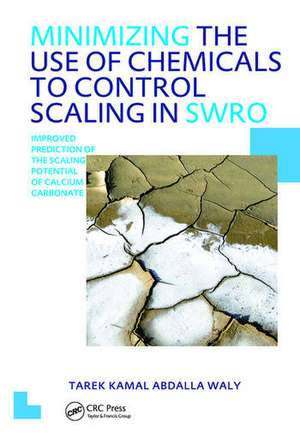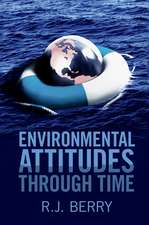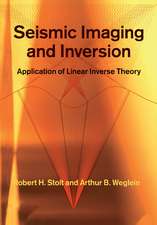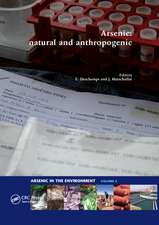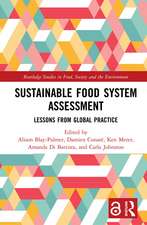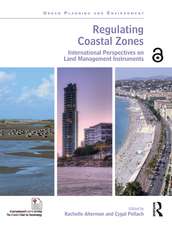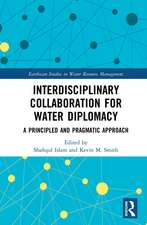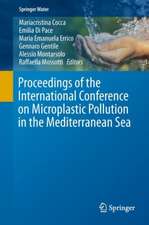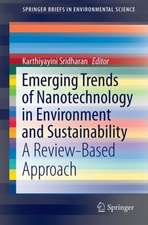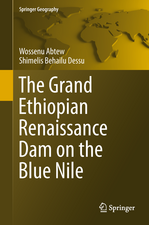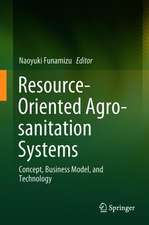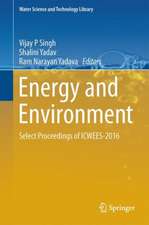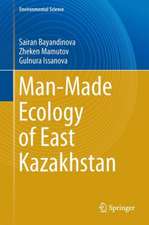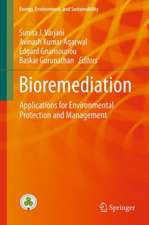Minimizing the Use of Chemicals to Control Scaling in Sea Water Reverse Osmosis: Improved Prediction of the Scaling Potential of Calcium Carbonate: IHE Delft PhD Thesis Series
Autor Tarek Kamal Abdalla Walyen Limba Engleză Hardback – 28 iun 2018
Din seria IHE Delft PhD Thesis Series
-
 Preț: 377.82 lei
Preț: 377.82 lei - 23%
 Preț: 473.10 lei
Preț: 473.10 lei - 23%
 Preț: 257.25 lei
Preț: 257.25 lei - 28%
 Preț: 492.31 lei
Preț: 492.31 lei - 23%
 Preț: 472.25 lei
Preț: 472.25 lei - 16%
 Preț: 322.98 lei
Preț: 322.98 lei - 29%
 Preț: 524.35 lei
Preț: 524.35 lei - 31%
 Preț: 295.46 lei
Preț: 295.46 lei - 22%
 Preț: 399.88 lei
Preț: 399.88 lei - 30%
 Preț: 1015.76 lei
Preț: 1015.76 lei - 17%
 Preț: 268.83 lei
Preț: 268.83 lei - 44%
 Preț: 256.76 lei
Preț: 256.76 lei - 23%
 Preț: 254.47 lei
Preț: 254.47 lei - 25%
 Preț: 339.78 lei
Preț: 339.78 lei - 13%
 Preț: 322.01 lei
Preț: 322.01 lei - 26%
 Preț: 455.79 lei
Preț: 455.79 lei - 28%
 Preț: 399.06 lei
Preț: 399.06 lei - 27%
 Preț: 427.41 lei
Preț: 427.41 lei - 22%
 Preț: 371.52 lei
Preț: 371.52 lei - 26%
 Preț: 373.21 lei
Preț: 373.21 lei - 26%
 Preț: 328.64 lei
Preț: 328.64 lei - 18%
 Preț: 348.86 lei
Preț: 348.86 lei - 22%
 Preț: 369.82 lei
Preț: 369.82 lei - 18%
 Preț: 174.31 lei
Preț: 174.31 lei - 26%
 Preț: 414.78 lei
Preț: 414.78 lei - 23%
 Preț: 454.94 lei
Preț: 454.94 lei - 27%
 Preț: 315.05 lei
Preț: 315.05 lei - 21%
 Preț: 256.32 lei
Preț: 256.32 lei - 18%
 Preț: 296.68 lei
Preț: 296.68 lei - 22%
 Preț: 353.39 lei
Preț: 353.39 lei - 23%
 Preț: 326.95 lei
Preț: 326.95 lei - 18%
 Preț: 349.36 lei
Preț: 349.36 lei - 28%
 Preț: 366.05 lei
Preț: 366.05 lei - 22%
 Preț: 322.47 lei
Preț: 322.47 lei - 27%
 Preț: 425.74 lei
Preț: 425.74 lei - 22%
 Preț: 211.93 lei
Preț: 211.93 lei - 27%
 Preț: 474.03 lei
Preț: 474.03 lei - 16%
 Preț: 322.98 lei
Preț: 322.98 lei - 27%
 Preț: 367.30 lei
Preț: 367.30 lei - 25%
 Preț: 328.22 lei
Preț: 328.22 lei - 23%
 Preț: 350.43 lei
Preț: 350.43 lei - 25%
 Preț: 472.25 lei
Preț: 472.25 lei - 28%
 Preț: 498.58 lei
Preț: 498.58 lei - 28%
 Preț: 349.59 lei
Preț: 349.59 lei - 24%
 Preț: 163.04 lei
Preț: 163.04 lei - 13%
 Preț: 350.29 lei
Preț: 350.29 lei - 28%
 Preț: 550.16 lei
Preț: 550.16 lei - 25%
 Preț: 552.62 lei
Preț: 552.62 lei - 23%
 Preț: 384.59 lei
Preț: 384.59 lei - 20%
 Preț: 177.00 lei
Preț: 177.00 lei
Preț: 1012.62 lei
Preț vechi: 1440.69 lei
-30% Nou
Puncte Express: 1519
Preț estimativ în valută:
193.77€ • 207.20$ • 161.56£
193.77€ • 207.20$ • 161.56£
Carte tipărită la comandă
Livrare economică 18 aprilie-02 mai
Preluare comenzi: 021 569.72.76
Specificații
ISBN-13: 9781138424302
ISBN-10: 1138424307
Pagini: 184
Dimensiuni: 156 x 234 mm
Greutate: 0.34 kg
Ediția:1
Editura: CRC Press
Colecția CRC Press
Seria IHE Delft PhD Thesis Series
ISBN-10: 1138424307
Pagini: 184
Dimensiuni: 156 x 234 mm
Greutate: 0.34 kg
Ediția:1
Editura: CRC Press
Colecția CRC Press
Seria IHE Delft PhD Thesis Series
Cuprins
Chapter 1 1.1 Background 1.2 Problem definition 1.3 The Overall Aim of the research 1.4 Research objectives 1.5 References Chapter 2 2.1 Abstract 2.2 Background Introduction Induction time Measurement tools Effect of exchange CO2 on induction time 2.3 Materials Inductively coupled plasma Conductivity meter pH meter Reactors Synthetic seawater concentrate preparation 2.4 Methods Measurement of calcium with ICP Salinity and accuracy of direct measurement of calcium in solution Measurement of calcium carbonate retained on membrane filters Effect of salinity, stability and accuracy of conductivity and pH measurment Effect of mixing on the induction time 2.5 Results Effect of salinity on the ICP measurements and accuracy Accuracy of measurement of calcium carbonate retained on membrane filters The effect of salinity on the conductivity and the pH measurments The effect of carbon dioxide exchange in an open system 2.6 Conclusions 2.7 List of Symbols 2.8 References Chapter 3 3.1 Abstract 3.2 Background 3.3 Materials Synthetic seawater concentrate preparation 3.4 Methods The effect of particles in synthetic seawater on the induction time The effect of particle addition Mixing effect 3.5 Results and discussion The effect of particles in synthetic seawater on the induction time The effect of particle addition The effect of mixing speed on the induction time The nucleation mechanism 3.6 Conclusions 3.7 List of symbols 3.8 References Chapter 4 4.1 Abstract 4.2 Background Introduction Solubility of salts Common methods used to determine the precipitation potential of CaCO3: Stiff & Davis Stability Index (S&DSI) Saturation Index (SI) Saturation Ratio (Sa) Mechanism of nucleation Homogenous nucleation Heterogeneous nucleation in a solution Induction time CaCO3 phases The formation of hydrated CaCO3 forms 4.3 Materials pH meter Reactors Synthetic seawater concentrate preparation 4.4 Methods Induction time measurements Solutions concentrations Calculation of SI using PhreeqC 4.5 Results The solubility product used by the S&DSI Homogenous and heterogeneous nucleation 4.6 Conclusions 4.7 List of symbols 4.8 References Chapter 5 5.1 Abstract 5.2 Introduction 5.3 Background Saturation indices Calculation of pH in SWRO concentrates Effect of salinity on dissociation constants Effect of salinity on the ion activity 5.4 Materials and Methods Pilot plant Concentrate pH in SWRO systems 5.5 Results and Discussion pH calculations using equilibrium equations pH calculations using manufacturers software pH prediction using Phreeqc evaporation model Field seawater concentrate measurements 5.6 Conclusions 5.6 List of Symbols 5.7 References Chapter 6 6.1 Abstract 6.2 Background Introduction Calcium carbonate phases The role of inorganic ions Solubility of salts Common methods used to determine the precipitation potential of CaCO3: Saturation indices (SI and Sa) Mechanism of nucleation Induction time 6.3 Materials pH meter Reactors Synthetic seawater concentrate preparation 6.4 Methods Induction time measurements Determination of co-precipitation Determination of the final crystal phase of calcium carbonate 6.5 Results and discussion Chapter 7 7.1 Conclusions 7.2 Recommendations for future work
Notă biografică
Dr Tarek Waly has 13 years experience in management, consultancy, sales, marketing and research in the water and wastewater treatment field. He is currently a lead R&D engineer at DOW Chemicals. He obtained his MSc from the UNESCO-IHE Institute for Water Education in Delft, and his Doctorate degree from the Delft University of Technology in Delft, The Netherlands.
Descriere
A comprehensive study on the scaling potential of calcium carbonate in seawater reverse osmosis systems (SWRO). The study provides a new approach for calculating the degree of supersaturation and the pH of the SWRO systems concentrates with the assistance of the feed-water pH and the inorganic carbon constituents.
